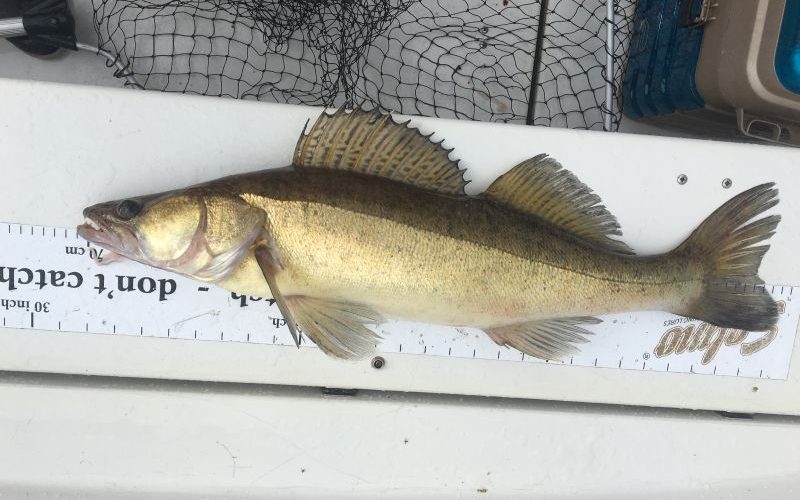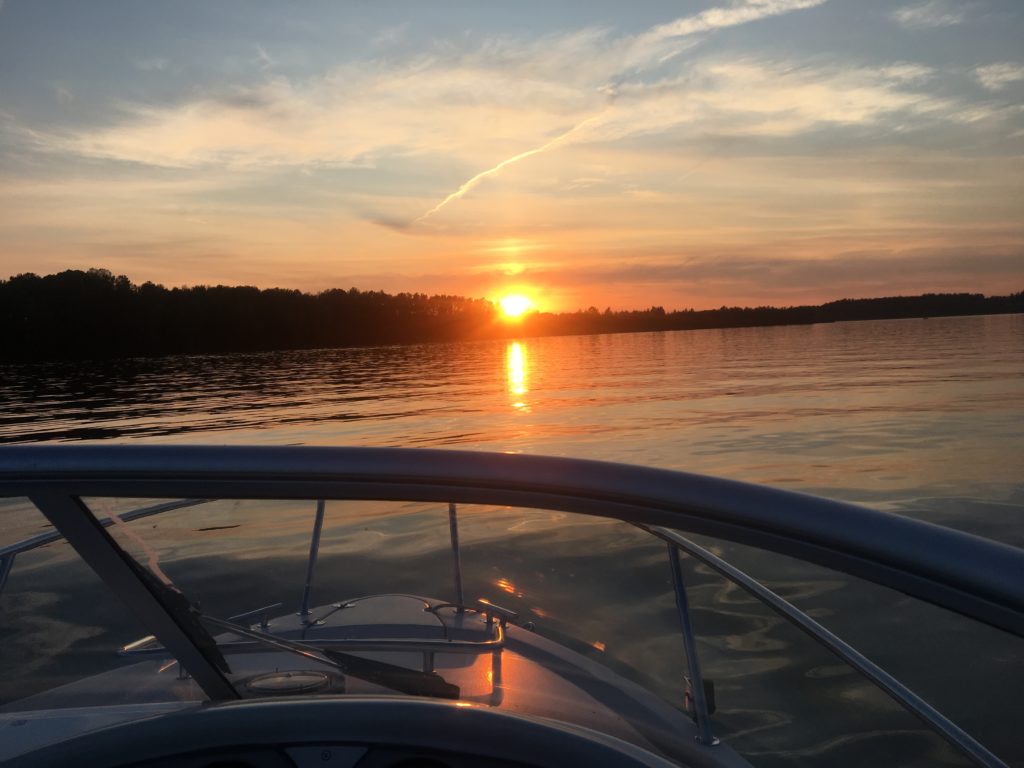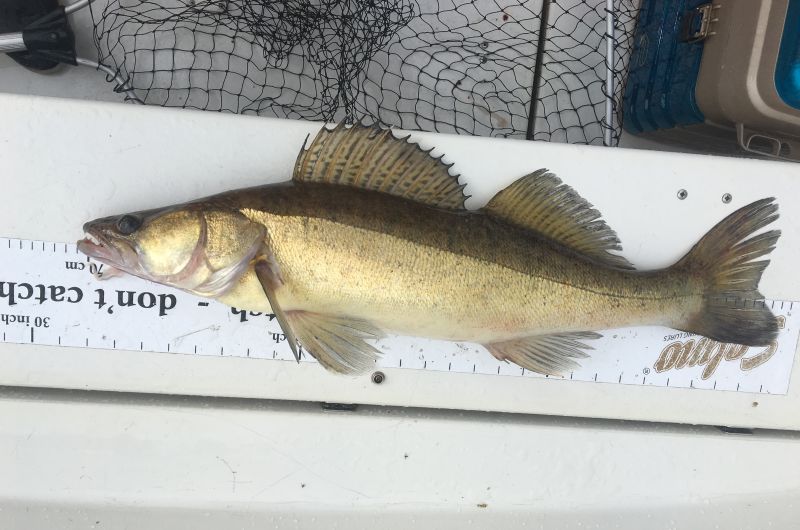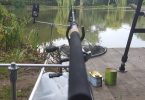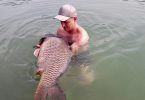ZANDER LUNACY:
Striking Gold During a Lunar Eclipse©
By SPF Cameron
Dripping with sweat, I finally made it up from the lake to the top of the hill. I burst through the kitchen door not long after midnight. Suddenly, the tranquillity of the night before was shattered and replaced with a strange maniacal excitement. The sort of over-zealous happiness only a fisherman can know when he has experienced what he believes to be truly profound. Then again, perhaps it was the sort of behaviour that lands a fisherman in divorce court if he is not careful.
When I was a child, I remember lying on the grass in our front yard in northern Minnesota on a summer night, staring up at the stars. The concept of infinity had never occurred to me before and the purity of wonderment one feels staring up into the heavens felt profound. Most fisherman probably know the feeling of relative peace and tranquility enveloping them when fishing at night under the stars.
After nearly a week of heavy weather, the skies began to clear while I was loading my gear into the boat. I had eight rods to put out and an entire night to fish. I had earned enough ‘brownie points’ from a good week of solid gardening to more than earn my freedom. The wind was calming and I hoped to get a chance to see the partial lunar eclipse as I pushed off from the dock and set the motor at trolling speed.
On clear days, the sky during midsummer in Sweden inevitably turns a golden orange at sunset. That is, if you can even call it sunset. The sun never really sets in the middle of a Swedish summer. Instead, it fades into the northern end of the lake beyond the ken of sight. It does leave a gentle glowing nightlight to make even the most anxious of fishermen feel at peace even in the middle of a big lake at midnight.
That is precisely where I found myself on the evening of 16 July 2019 – alone on Lake Fryken, just before midnight. I was watching the partial lunar eclipse in the southern sky through a new pair of binoculars my family had given me as a birthday present. Through them, I could see the eclipse as I have never seen one before, aided by the size of the moon not far from the southern horizon.
Lake Fryken is a finger lake stretching for more than 60 miles (approximately100 kilometres) to the north of Karlstad. It has become one of the best lakes for zander in all of Sweden over the last decade. In my opinion, it is likely true for most of Europe as well. The lake is populated by a variety of species but is equally famous for pike as well as zander.
In Sweden, the nearest relative of zander is called ‘gös’ but it is clearly the biological equivalent of zander in the U.K. and ‘walleye’ in America, presuming you give or take a few thousand years of parallel evolution. The only noticeable difference with Swedish gös is the slight narrowing of its head towards the mouth and the intense golden hue from its scales. Zander from Lake Fryken can reach in excess of 36 inches (90 cm plus) and pike are routinely caught in excess of 40 inches (100 cm plus).
The mercurial rise in the zander population is difficult to understate. During the mid to latter part of the 20th century, the biosphere of many Swedish lakes was nearly destroyed. This was due to both local industry (primarily forestry and iron ore) and the effects of pollution from other countries. Given the predominant winds, the massive pollution caused by the former Soviet Union created acid rain that brought Swedish lakes to the tipping point. This culminated on a rainy night at the end of April in 1986 with the meltdown of a nuclear reactor at Chernobyl. The meltdown that day sent a blanket of radioactive particles over the north of Sweden.
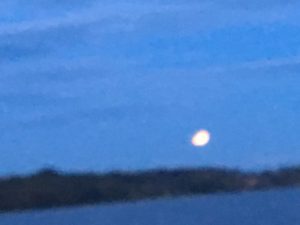 In any event, the lunar eclipse witnessed through my binoculars was nothing short of magical. I have never had a telescope so the moon appeared larger and more clearly than I had ever seen it before. I could even see details of its surface and the dark shadow of the sun slicing across it at midriff. The moon itself appeared to glow. It was as if its own light source, rather than the illumination of the sun, was now sharing its radiance.
In any event, the lunar eclipse witnessed through my binoculars was nothing short of magical. I have never had a telescope so the moon appeared larger and more clearly than I had ever seen it before. I could even see details of its surface and the dark shadow of the sun slicing across it at midriff. The moon itself appeared to glow. It was as if its own light source, rather than the illumination of the sun, was now sharing its radiance.
The sudden and steady sound of the line being pulled off one of my reels snapped me out of my trance and brought me to attention. My brief foray into astrology was over for the time being as I tried to find which rod was hit. Whatever it was, I knew by the steady whine of the reel I had hooked into something truly exceptional. The mental list read something like this: (1) a Russian submarine, (2) a log, or (3) a very big fish. Having quickly ruled out the first possibility given I was fishing on an inland lake and the Cold War was long since over, I focussed on the latter two possibilities.
Thankfully, I found the rod and it was one of only three rods that did not have a ‘paravane’ attached. When trolling without sideboards, paravane are necessary to use multiple rods. They push the line and the related lure away from the boat to either side. They can also cause a huge, gnarly mess when a fish strikes on the outermost line and all the rods need to be reeled in or adjusted to deal with the fish.
The word ‘paravane’ is best known in English due to their use as minesweepers during World War II. The rod that had taken the strike was fortunately directly behind the boat. That meant I didn’t need to worry about rearranging rods and could play the fish directly behind the boat.
The rod in question was bent over fully when I pulled it out of the rod-holder at the back of the boat. I was trolling at about 2.3 knots and by the sound of the reel, line was coming off at about the same speed. Still startled, I found myself holding the rod, with the base of it stuck firmly into my thigh.
We use big rods on Lake Fryken. Not quite ocean fishing rods but the size of the zander and pike requires you to avoid light tackle. As I adjusted the drag to slow the rate of line going out without any success, I thanked my lucky stars the reel had been recently loaded with 500 yards of strong, blue monofilament.
That probably sounds like a lot of line to most fisherman. There is a reason why so much is needed and it relates to the depth of the lake. When you fish deep lakes, the distance from your lure to the fish can be more than 50 metres (or more) – straight down. That is before you begin to consider how far the fish is from the boat to any side.
It is still fair to ask why I had so much line on the reel and the answer is a bit embarrassing. For starters, the excessive line was on the reel because of my proclivity of attaching it to the propeller shaft. A dear friend, Anders, who taught me how to troll the Scandinavian lakes, gave it to me. He has won the Nordic Trolling Masters twice and is highly regarded in the Swedish angling community.
He also knows I am not the greatest fisherman in the world. Perhaps out of sympathy (or knowing my proclivity to wind it around my propeller), Anders gave me 5 kilometres of line he won in a fishing tournament. The only problem with the line he gave me is its blue pigment stains your fingers for several days whenever you try to re-spool a reel with it. Presumably, I was being marked with the scarlet letter, but this time in blue.
The fish, log, u-boat, etc. wouldn’t quit. After about five minutes, my forearms began to cramp. I was unable to stop the line going out no matter how hard I tightened the drag without risking the line breaking. I put the motor in neutral in intervals to slow the boat. Regardless, the monotonous drone of the line coming off the reel persisted. Knowing I needed to make a decision (and once again dismissing that I might be hooked into a Russian submarine), I decided to put the rod back in its holder. It was well hooked whatever it was and didn’t need me to keep the line taut.
The only problem with putting the motor into idle when you are trolling with paravane is that they all begin to converge as the speed is reduced. This is because the flow of water pushes the paravane off to either side. Once the flow slows down, the lines move intrinsically towards the boat and thus each other. This forces you to either push the motor into gear again or watch helplessly as the lines become tangled. In other words, at some point I needed to make a decision on whether to give up and cut the line or to make a stand. In the soft glow of the lunar eclipse, I chose the latter.
For the next ten or so minutes, I reeled in all of the lines of the other seven rods – the ones that weren’t hooked onto the proverbial Russian submarine. A precise order needs to be followed to get the lines in safely and untangled. After more than a thousand hours trolling, I knew how to do it. The continuous loss of line and the intermittent starting and stopping of the motor made it more difficult than it should have been. For all I knew at the time, a submerged log was destroying an otherwise golden opportunity to be alone in nature viewing a lunar eclipse.
Around then, I remembered something special from my childhood. It was a story my grandfather had told me. The story explained why he had all the scars on his right hand. It was the story of ‘Old Blue’, a legendary pike that supposedly lived in the shallow waters of Pine Lake not far from my hometown.
As the story goes, my grandfather was fishing Pine Lake one fine morning, or intending to do so. Given the small motor and the shallow depth of the remnant glacial lake, he put out a ‘daredevil’ in the hopes it might get hit by a hungry pike for breakfast. His ‘daredevil’ got caught on a log, or so he thought, half way across the lake to where he intended to fish. When he circled the boat back and cut the motor right above the log, he couldn’t free the lure no matter how hard he tried.
Just when he was about to give up, he told us suddenly the ‘log moved’. Our eyes lit up whenever he told us the story. At that point, one or more of us would shout, ‘It was a fish grandpa!’ It made us so excited and he had the scars to prove it. My grandfather had no less than 30 stiches in his right hand.
He had forgotten his net that morning and had tried to pull the huge pike over the side of the boat. Half way over the side, the huge fish suddenly fought, forcing my grandfather’s hand up into its gills and farther up into its mouth. The rows of sharp teeth possessed by a monster pike raked across his hand. Bloodied, he headed home to my grandmother who needed no more proof than to see his hand to believe what happened.
As I reeled in the last of the seven other lines, Lake Fryken seemed to be in harmony with me. The heavy waves pushing out of the northeast for the entire week were now almost calm. Once I had the last rod secured, I turned towards the front of the boat to take one last good, long look at the lunar eclipse. It was beautiful beyond words. With a profound sense of peace, I shut the motor off entirely. I listened as the whine of the reel letting line out fell at first to a lower decibel and then went silent.
At first, the ensuing stillness felt like the noisy quietness you hear when you shut off a car engine in a garage. Then the quietness spread into a beautiful, peaceful silence. The chaos of everyday had suddenly been shut off in-toto.
All that was left was one rod, the beauty of Lake Fryken, the lunar eclipse, and a log or maybe a fish (or a Russian submarine, but like I said before, that was highly unlikely). Even more majestic, the partial lunar eclipse framed the night sky in a soft, unearthly glow that, coupled with the silence from the motor being shut off, left me feeling like I was experiencing something truly profound.
I reeled in the dead weight of whatever was on the other end of the line. It felt very much like a log that had somehow managed to get hooked in about 100 feet of water. Nothing really made sense. All I knew was that with the motor shut off, in the quietness of Lake Fryken, I could feel the boat moving towards the object as much as it was moving towards me.
The longer the battle went on, the more I became convinced I was not dealing with a fish. It didn’t swim around. It felt more like I was dragging an old tyre towards me. I never even bothered to grab the net to have it beside me. Instead, I cranked in the reel until the log, tyre, u-boat, whatever, was directly below the boat. That was a bit strange but I really wasn’t certain about the buoyancy of logs, tyres or even Russian u-boats for that matter.
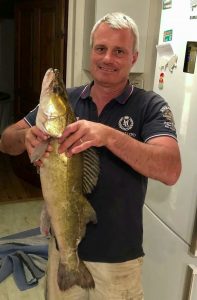 According to my reel, the line was out more than 50 feet directly below the boat as I pulled up what felt very much like dead weight. I kept on reeling in and watching the depth counter. Soon I had only 20 feet left, cranking hard on the reel to be done with whatever piece of garbage might be attached.
According to my reel, the line was out more than 50 feet directly below the boat as I pulled up what felt very much like dead weight. I kept on reeling in and watching the depth counter. Soon I had only 20 feet left, cranking hard on the reel to be done with whatever piece of garbage might be attached.
Then it happened: the ‘log moved’. I instantly felt all the intensity and excitement I have ever known hearing my Grandfather tell the story of Old Blue. How could I be so stupid? I kept the line taut and worked my way back to where I kept the net and quickly had it beside me. After a few more cranks on the reel, I saw the fish in the back light of my boat.
If you grow up in Minnesota, the sight of a 14 pound walleye will make your eyes bulge. At least, mine did at that moment. Once I saw the fish, I reeled it to the surface and stuck the net under it as quickly as possible. As I leveraged the fish out of the water and into the boat, the handle of my net bent to a 45 degree angle and then it was in the boat. A beautiful gös even my Grandfather would have been proud to catch.
By now it was nearly 1 am. The moon was rising and the lunar eclipse was far less prominent in the southern sky. I put the last rod in its holder and raced the boat home across the gentle waves. I practically threw the rods in the boathouse in my rush to get home. I couldn’t wait to tell someone special about what I had experienced. With the boat secured, I raced up the hill towards the welcoming lights of the kitchen.
THE END
© Copyright SPF Cameron 2019

